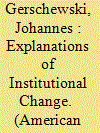|
|
|
Sort Order |
|
|
|
Items / Page
|
|
|
|
|
|
|
| Srl | Item |
| 1 |
ID:
171929


|
|
|
|
|
| Summary/Abstract |
In this article, we aim at sharpening common understandings of the notion of political crisis to better explain the trajectories of authoritarian transformations during popular uprisings. We make three major claims. First, we propose a definition of crisis as brief moments of institutional fluidity and openness in which a process can take different directions. We delineate the crisis concept from the concept of critical junctures and outline how our approach contributes to the methodological debate on ‘near misses’. Second, we indicate how the de-institutionalisation processes leading up to a crisis are to be analytically distinguished from within-crisis moments. We argue in favour of a discontinuity approach that takes into account the different temporalities of gradual lead-up processes and rapid within-crisis dynamics. Finally, we illustrate our theoretical and analytical reasoning with concrete cases from the authoritarian crises of the Arab uprisings, whilst suggesting that our argument can travel to other areas of research in which crisis narratives have gained prominence.
|
|
|
|
|
|
|
|
|
|
|
|
|
|
|
|
| 2 |
ID:
177185


|
|
|
|
|
| Summary/Abstract |
Previous research on institutional change has concentrated on two types of explanations. On one hand, the dualism of path dependency and critical junctures has advanced our understanding of how institutional change occurs due to sudden exogenous shocks. On the other hand, more recent critiques have established a better understanding of endogenous, gradual change. This article is motivated by observations that current research tends to overlook what I call the “missing diagonal.” I argue that we need to disentangle the sources of a cause (exogenous vs. endogenous) from its time horizon (sudden vs. gradual). By cross-tabulating these two dimensions, the proposed typology of institutional change explanations is able to capture complex multilayered as well as sequential arguments of institutional change. The typology urges scholars to be more precise with their social science language of erosion and decay, while serving as a generator for an innovative research agenda on endogenous ruptures.
|
|
|
|
|
|
|
|
|
|
|
|
|
|
|
|
| 3 |
ID:
161310


|
|
|
|
|
| Summary/Abstract |
Legitimacy is a key concept in political science. It has deep normative roots in democratic theory and refers usually to righteous, just, fair, and therefore acceptable rule. However, non-democracies also try to create a following among their citizens. They also engage in justifying their rule through politicization, be it of religion, ethnicity, or ideologies ranging from left-wing communism to right-wing nationalism. Against this backdrop, I pose the question: does it make sense to use the concept of legitimacy for both types of regimes, democracies and autocracies alike? Or, do we overstretch the concept when transplanting it to the non-democratic realm? And, empirically, how can we assess to what degree a non-democracy is viewed as legitimate by its citizens? I aim therefore at defining what legitimacy and legitimation is in autocratic settings; drawing a semantic map of rival concepts like support, trust, and loyalty; and tackling concrete challenges in measuring this elusive concept.
|
|
|
|
|
|
|
|
|
|
|
|
|
|
|
|
|
|
|
|
|